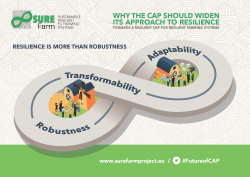Why the CAP should widen its approach to resilience
The European Commission considers improving the resilience of the agricultural sector as necessary to achieve the objectives of the Common Agricultural Policy (CAP). Both in the current CAP and the legislative proposals for a CAP post-2020, the Commission relies on four groups of instrument to increase the resilience of European agriculture: direct payments, rural development programs, risk transfer instruments and market management measures. While these instruments may help to stabilise farm income in the short run, their effect on resilience in the long run is less clear. SURE-Farm defines resilience as maintaining the essential functions of a farming system – the provision of food, feed, fibre and public goods, such as ecosystem services – in the face of increasingly complex and volatile economic, social, environmental and institutional challenges. The resilience of farming systems depends on their capacity to deal with shocks and stresses. SURE-Farm emphasizes that three capacities for resilience should be distinguished: Robustness is the ability to withstand shocks, such as sudden price oscillations or adverse weather events. It can build on individual or collective resources (e.g. savings) and capacities (e.g. recovery know-how). Adaptability is the ability to change production, marketing and finance strategies without changing the operational logic of the farm or the farming system, for instance by using new technologies or marketing channels. Transformability is the ability to change the operational logic of a farm or farming system in response to either severe shocks or enduring stress that make business as usual impossible, or to capture novel opportunities. A difficult task for farmers as well as for policymakers is to strike the right balance between robustness, adaptability and transformability. Farmers do not operate in a vacuum. Capacities for resilience cannot be developed by farmers alone, but depend on the collective activities of those collaborating with farmers, such as suppliers, customers, service providers, financial institutions, public administrations, etc. We call this network the farming system. Each farming system provides unique opportunities to enhance resilience, depending on the interdependence between the actors in the farming system. Therefore, policymakers should ensure that public policies such as the CAP support the development of collective capacities for resilience. The Commission proposes a CAP post-2020 that reaches common goals through a new delivery scheme in which Member States are given enhanced discretion to draw up CAP support plans and choose a bespoke set of instruments. At the same time, however, the basic set of instruments remains largely unchanged, with the largest budgets allocated to area-based direct payments (albeit they will be partially allocated to eco-schemes). This means that most resources are devoted to short-term robustness of farms at individual level, but it is unlikely that farmers and farming systems invest these resources to increase their capacities to adapt or transform in the long run. A more decentralised new delivery scheme might provide more opportunities to address the place-specific adaptation and transformation challenges of Europe’s diverse farming systems. However, insufficient resources are invested in related resilience and collective capacities, and this is likely to undermine the capacity of Europe’s agriculture to adapt and transform in response to radically changing external conditions. Instruments to enhance adaptation are available in the rural development programs, and particularly the European Innovation Partnership EIP-AGRI, but they should be allocated more resources, not less. Flexibility, experimentation and learning are important to broaden the focus of these measures from mere adaptation to strengthening the capacity of farmers and farming systems to transform in the face of persistently changing circumstances.
Palabras clave
Países
Belgium, Bulgaria, Switzerland, Germany, Spain, France, Italy, Netherlands, Norway, Poland, Romania, Sweden, United Kingdom



